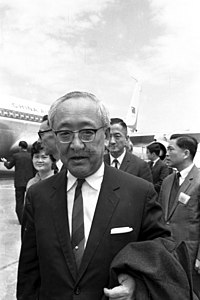Takeshi Watanabe
( bureaucrat, deep state operative) | |
|---|---|
 | |
| Born | 1906 |
| Died | 23 August 2010 (Age 104) |
| Nationality | Japanese |
| Alma mater | Tokyo Imperial University |
| Member of | Trilateral Commission |
Father of the Asian Development Bank. First Asia Pacific Chairman of the Trilateral Commission
| |
Takeshi Watanabe was a Japanese civil servant in the finance ministry. Because he could speak English, he dealt extensively with the GHQ occupation authority after the war. He was the first president of the Asian Development Bank and the first Asia Pacific Chairman of the Trilateral Commission.
Early life
Born in Tokyo, he attended the Faculty of Law at Tokyo University, in the department of Political Science, and graduated in 1930.
After joining the Ministry of Finance the same year, he soon got leave to study in the United Kingdom in 1931, coming back in August 1932. In 1934 he was seconded to the Secretariat for Manchuria and was involved in the formulation of a planned economy as one of the so-called "innovative bureaucrats". At the same bureau, he belonged to the Stock Breeding Division and worked side by side with Major General and deep state operative Hideo Iwakuro. In 1937 he moved to the Ministry of Finance Budget Bureau and then the Ministry of Education, the South Pacific Mandate, and the Kanto Bureau, working next to Takeo Fukuda. In March 1945, during the war, he became the newly established Minister's Secretariat Planning Section Chief, but the war ended before he could start.
He became End of War Liaison Department Manager (later External Director). Having studied in the United Kingdom and being a chief of the exchange department, he spoke English, so he did most of the negotiations with the GHQ headquarters about finance throughout the occupation era, and later became involved in foreign relations.
GHQ spared the disbandment of the Ministry of Finance because of the outbreak of the Cold War and the urgent need to rebuild the Japanese economy. Even as the U.S. military-issued scrip-currency became legal tender, the Ministry of Finance became the top government ministry instead of the Ministry of Interior, which was dismantled at this time.
At the same time a group of cutting-edge New Deal idealists within GHQ were at the helm of the Japanese economy. They insisted on a balanced budget to prevent inflation. When Detroit bank manager (and later Bilderberger) Joseph Dodge visited Japan, Watanabe became one with the responsibility for the invited. An anti-inflationary program called The Dodge Line was decided on, and Finance Minister Hayato Ikeda, Kiichi Miyazawa, Secretary of Finance, and Watanabe worked closely with Dodge and others. In addition, Watanabe had a friendship with a Mr. Kaufman of the American Council on Japan from before the war.
When Japan signed the San Francisco Peace Treaty in September 1951, he provided support and attended the IMF/World Bank as an observer on behalf of Japan to prepare for membership. In July 1952, he became a diplomat to the United States. He dealt with Japan's external debt disposal problem from before the war and the conclusion of the Japan-US double taxation prevention agreement, and with the IMF/World Bank membership and the election of directors from Japan. In 1956, he succeeded the first Japanese director Takeo Yumoto and made efforts to negotiate borrowing of foreign capital and increased loans to Japan.
After that, he was elected as the first president in 1966 of the the Asian Development Bank, with the cooperation of Kaoru Ohashi of the Tokiwabashi Economic Research Institute and also from the Ministry of Finance. He retired in 1972.
In 1973 he became the first Asia pacific president of the Trilateral Commission.
Later, in 1985, he became president of Japan Credit Rating Agency.
Family and Connections
His grandfather was Kunitake Watanabe, who was the Minister of Finance and Communications of the Cabinet of Hirobumi Ito, and his father, Chifuyu Watanabe, was also the Minister of Justice. Satosi Watanabe, a distinguished physicist, is his younger brother. Chiharu Watanabe is his uncle. The first Indian Prime Minister Jawaharlal Nehru lived in the same apartment house as him when he was stationed in London, and he came to visit him. There were seven people including Watanabe, including Kazuyuki Kono, Tsuneo Uchida (later the Liberal Democratic Party's deputy and secretary general of the party), Munetaka Kojima, and Haruji Yoshida, who became the administrative vice-minister of the Ministry of Finance after the war. However, the other two died before and after the Pacific War.